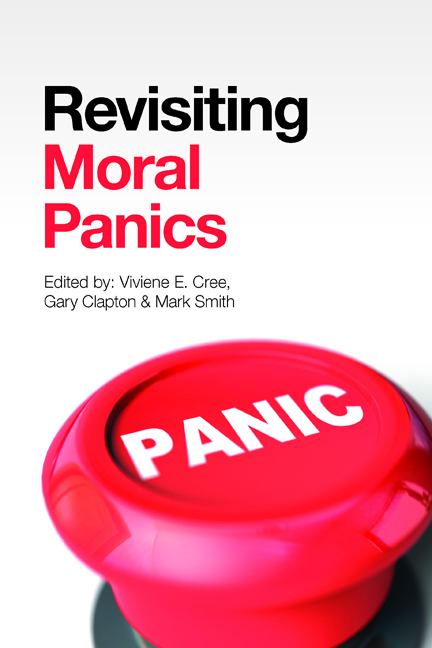Book contents
- Frontmatter
- Contents
- Contributors
- Preface
- Commentary moral panics yesterday, today and tomorrow
- Part One Gender and the family
- Part Two Moral panics in our time? Childhood and youth
- Part Three The state, government and citizens
- Part Four Moral crusades, moral regulation and morality
- Afterword the moral in moral panics
- Conclusion Moral panics and beyond
- Index
Eight - Lost childhood?
Published online by Cambridge University Press: 08 March 2022
- Frontmatter
- Contents
- Contributors
- Preface
- Commentary moral panics yesterday, today and tomorrow
- Part One Gender and the family
- Part Two Moral panics in our time? Childhood and youth
- Part Three The state, government and citizens
- Part Four Moral crusades, moral regulation and morality
- Afterword the moral in moral panics
- Conclusion Moral panics and beyond
- Index
Summary
Introduction
The trope of ‘lost childhood’ is a recurring one within UK newspapers. Every few years, a news article, editorial or letter leads with this idea, causing some media interest and connected articles, but then fades away until the next time. For those in childhood studies, the trope is familiar, drawing on adults’ idealisations of childhood based around children's ‘pricelessness’, innocence and vulnerability. A less familiar way to consider the trope is through the lens of moral panic theory. This chapter brings together concepts from moral panics and childhood studies to help analyse this ‘lost childhood’ trope. As Garland writes, sociologists using the concepts of moral panics start with scepticism that ‘permits the initial observation’ to give ‘way to a different attitude – one that is more analytic, more explanatory, or perhaps better, more diagnostic’ (Garland, 2008, p 21).
The chapter uses one particular example of the ‘lost childhood’ media articles, a letter published on 23 September 2011 in the UK newspaper the Telegraph. The article was titled the ‘Erosion of childhood’, with the sub-title ‘Here is the full letter from more than 200 experts about how childhood is being eroded by a “relentless diet” of advertising and addictive computer games’. The letter was concerned about ‘too much, too soon’ for children, particularly in relation to ‘increasing commercial pressures’, starting formal education too early and spending time indoors with screen-based technology. The letter cited the UNICEF (2007) publication on children's well-being (where the UK was ranked at the bottom of 21 OECD countries) as key evidence. It made policy recommendations, including information campaigns on children's developmental needs and avoiding a ‘consumerist screen-based lifestyle’, establishing a play-based curriculum in nurseries and primary schools, encouraging outdoor play and connection with nature, and banning marketing directed at children up to the age of seven. Two hundred and twenty-eight people signed the letter.
The following discussion brings together relevant concepts from moral panics – that is, the stages of moral panics and, particularly, ‘moral entrepreneurs’ – to (re)consider the letter. It will end by reflecting on the implications of the letter's moral claims and the usefulness of moral panic theory to consider this media trope of ‘lost childhood’.
- Type
- Chapter
- Information
- Revisiting Moral Panics , pp. 93 - 102Publisher: Bristol University PressPrint publication year: 2015



